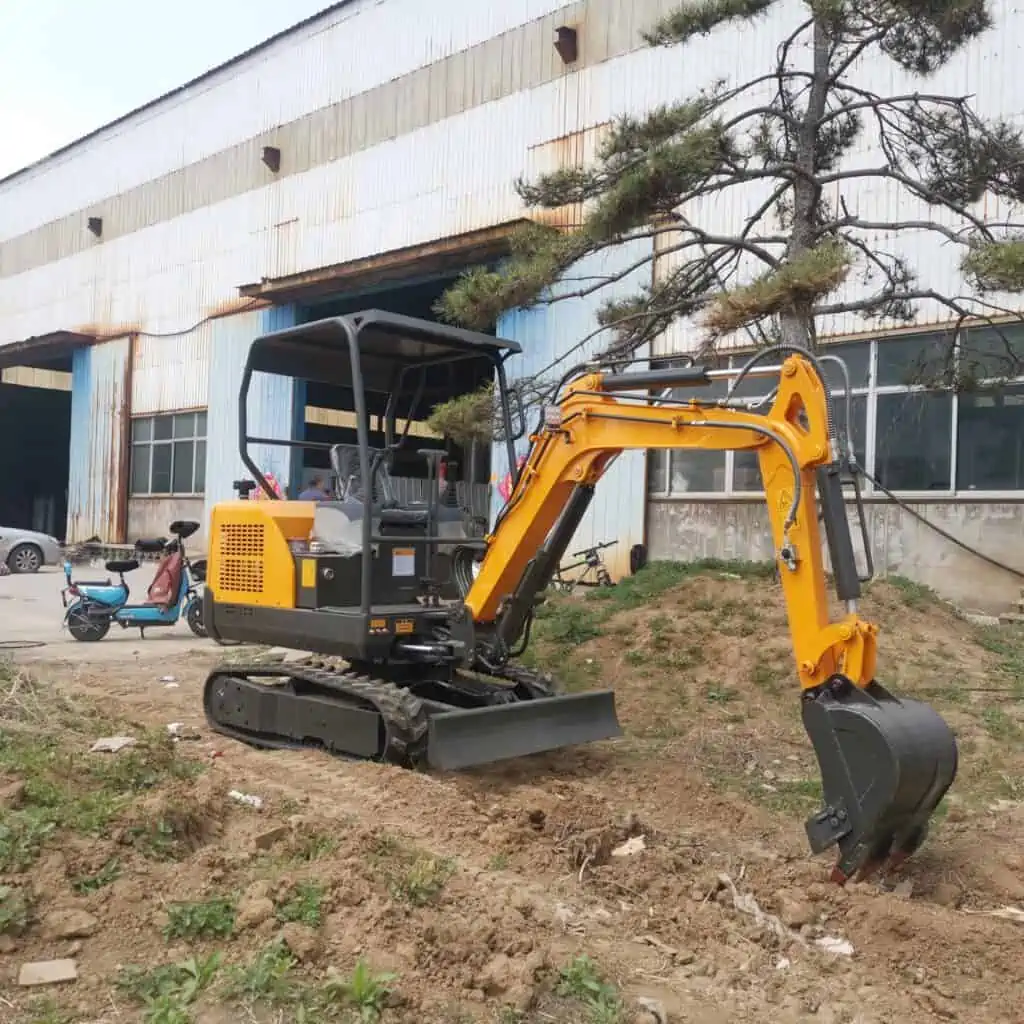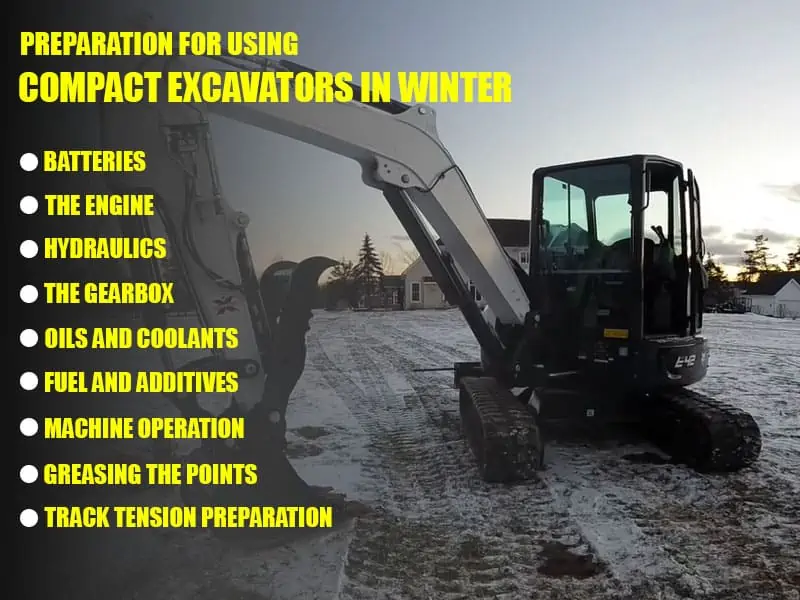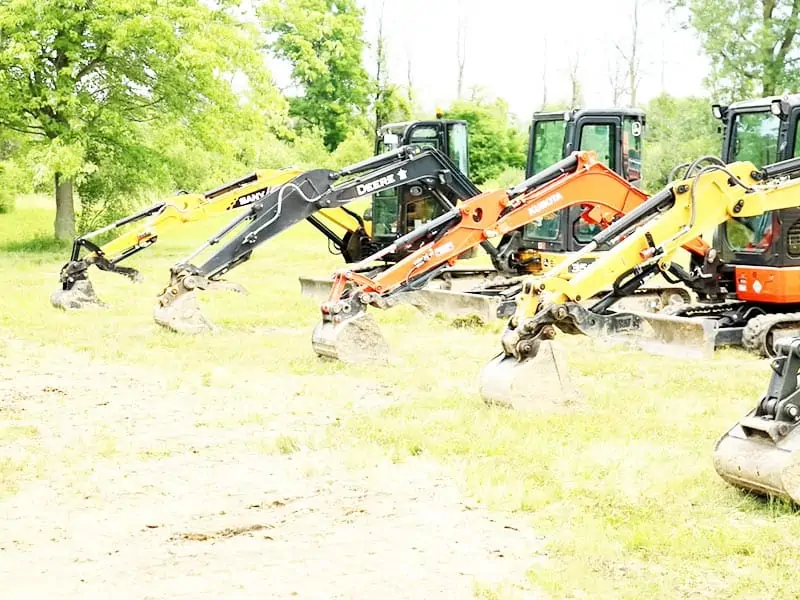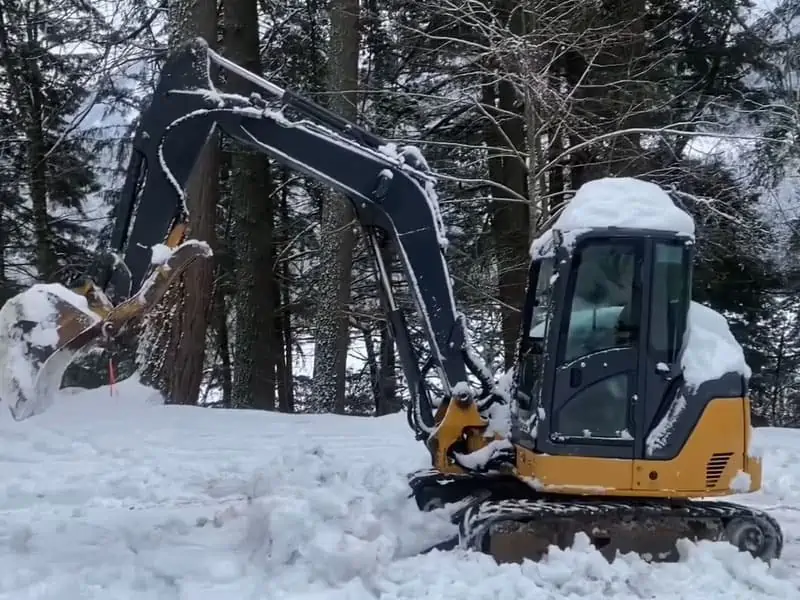An ultimate guide on using compact excavators in the winter cold season. As you know, winter is near; for contractors living in colder regions where freeze laws prevent earthmoving, the business has slowed. Whether you continue or not operating in these winter months, winterizing your mini excavator equipment is very important.
Because you have a lot of investment in that construction equipment as it is your future business, they represent. A compact excavator needs the same maintenance and care as its larger counterparts. With all the same components of standard-sized excavators, compact excavators demand proper maintenance for using compact excavators in the cold winter season and achieving the desired service life.

Your compact excavator must maintain its working ability all year long, even in the winter cold. Winterize your heavy equipment to ensure it will work in freezing temperatures. If you fail to take proper care in winter and equipment maintenance, then using compact excavators in winter sustains severe damage that will net you expensive repair bills.
Winterizing your compact excavator is not only about readying a machine for colder temperatures. You will also want your operators to know how to use compact excavators in the cold winter season. This post will help you use compact excavators in the cold winter.
Table of Contents
TogglePreparation for using compact excavators in the cold winter season

Choice the suitable synthetic and multi-grade oil covers a wide range of temperatures experienced throughout the year. Working below zero degrees Fahrenheit, you should consider cold weather hydraulic and engine oils. In freezing weather, compact excavators, you should use winter diesel or arctic diesel, which features a lower freezing point and a better Cold Filter Plugging Point.
- You can use additives with the proper diesel blend if it is unavailable.
- In freezing weather, you should consider equipping your compact excavator with specific options:
- Engine block heaters: Before starting, warms up the engine block.
- Diesel-powered coolant heaters: It is a dual purpose, to help cold weather start and warm the cab.
- Water separators with heaters: These help minimize wax buildup in diesel fuel.
Batteries
If you did not use your compact excavators for an extended period, you would be required to properly store the battery away from freezing temperatures.
Batteries can lose up to 35% of their power at 32 degrees F and 60 % at 0 degrees F. To prevent the battery from draining in cold temperatures, you should test its voltage before storing it inside.
Greasing the points
You know that grease is the lifeblood of all pins and bushings. So operators must grease all pins and bushings daily. It is also necessary to ensure that you use good grease coverage for winter. The operator’s manual will help to identify each grease point and give quantity recommendations and grade of grease.
If multiple operators use your compact excavators, you can mark less obvious grease points with orange paint to help all operators perform the task. The over-greasing can also create problems. Therefore one to three shots of grease are enough to do the job.
Track tension preparation for using compact excavators in the cold winter season
Track tension is a service point on compact excavators that require more attention. Most excavators have rubber tracks, which you must keep properly adjusted to maximize longevity and minimize wear on the track and its components.
Winter is particularly tough for rubber tracks because the extreme cold, snow, ice, and sloppy ground conditions create problems, so extra vigilance is suggested. Operators should always follow the operator’s manual to check track sag measurements daily to ensure correct track tension.
If the track runs, loose will quicken wear, causing wasting of your downtime and putting a stop to production for the reinstallation of a new track. While a track running too tight will cause the rubber material to tear fast and significantly increase wear on the other track system components.
Fuel and additives
The moisture occurs when the engine is hot, and the outside temperature is freezing. Moisture can develop in fuel, especially when the compact excavator is not working. It can occur as quickly as resting over the weekend. The gelled fuel may clog the fuel separator. An anti-gelling additive in diesel fuel can improve your engine startup in cold weather.
It also will improve cold flow by averting gelling and will even clean deposits from fuel injectors, combustion chambers, and intake valve deposits. You can easily find these additives are readily at any local dealership or service shop. Change the fuel and separator filters to ensure no moisture is retained in the filters that might cause problems later on.

The Gearbox
The gearbox is one of the most critical components of a compact machine’s performance. It is often neglected when it comes to servicing. In the winter, gearboxes can be covered in mud and snow, with the fill and drain plugs not visible. Most gearboxes require an oil change every 1,000 working hour intervals, depending on the manufacturer’s advice.
Propel drive gearboxes of some manufacturers may fail as early as 1,500 to 3,000 hours. Compact excavators have small but expensive gearboxes to manufacture because they have the same internal parts as their larger excavators. So you have to change the gearbox oil quickly, as the typical gearbox oil capacity is a quart or less, but it is not so expensive.
Oils and coolants
You should change the oils in your construction equipment before and after the winter months. Because in the winter, we recommend using low-viscosity oils that will flow with less resistance. These oil changes include oils for the engine, transmission, differentials, and hydraulic system.
Today, most diesel engines come with glow plugs or heating grids, similar elements you see in electric heaters. Still, a bit more heavy-duty A heating grid preheats air into the internal combustion chamber, which heats the engine to a suitable temperature for combustion. In another way, spraying cold fuel into the chamber can gel and approach these parts.
If your compact excavator is starting hard and inefficient, combustion has the potential to cause damage to plugs and cylinder heads. Some diesel engines are equipped with built-in electric-powered block heaters to keep the engine block warm all night. A diesel engine needs heat to ignite the fuel, so there are no spark plugs.

On startup in cooler temperatures, the heat from compression needs a little help; the grids heat the intake air. When you live in colder climates, you will need to install oil pan heaters. It will make it easier to start and preheat the engine oil. When cold, oil becomes very thick and difficult to pump.
It protects engine components, extends battery life, reduces emissions, and contributes to operator comfort inside the cab by allowing the engine to get hot quickly. Coolant 50/50 is an ideal ratio to coolant water, but it is suggested that you use a 70/30 ratio of coolant to water in cooler weather. It will prevent the water from freezing.
Machine Operation
As you are prepared to use compact excavators in the winter cold season, driving other vocals operating a compact excavator in below zero temperatures can cause dangerous situations if you do not prepare appropriately for use in winter.
Extra care is required for small excavators operating in these conditions in case of black ice, which can cause the machine to slip. Operators should also take extra caution when entering or exiting the cab, handles and grip plates can be iced and slippery.
Hydraulics
When you are working in average working temperatures, hoses can flex, but in colder climates, due to coldness, hydraulic hoses can crack when flexing. More the exposed and uninsulated electrical wiring can become brittle and break.
The Engine
In cold temperatures using compact excavators in the winter cold season, you have to select the oil used in your engine that matches the outside temperature Engine oil viscosity should verify to make sure you are using the correct one. compact excavator in the winter cold
So instead of waiting extra time for the oil to flow after the equipment has been turned on, you must use a low-viscosity engine oil so it can flow faster.
Bottom line
If you use your compact excavator properly, winter care will add years of practical, lifespan, and efficient service to your compact excavators. If you want to buy a new compact excavator, visit Hixen, and if you want more information, contact us.
